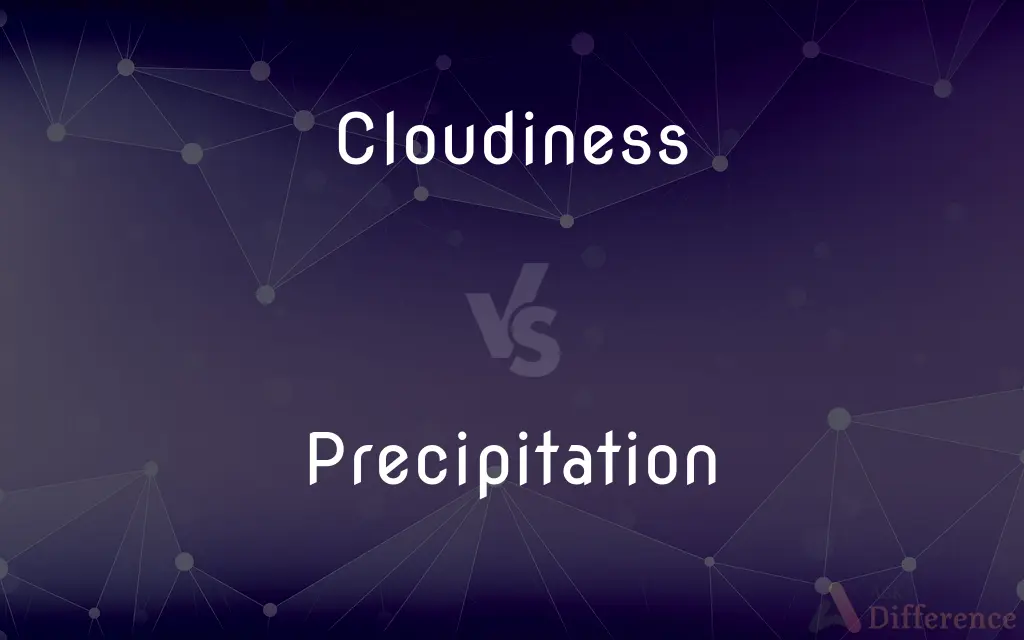Cloudiness vs. Precipitation — What's the Difference?
By Tayyaba Rehman — Published on November 19, 2023
Cloudiness refers to the amount of clouds covering the sky, while Precipitation is any form of water, like rain or snow, falling from the atmosphere to the ground.

Difference Between Cloudiness and Precipitation
Table of Contents
ADVERTISEMENT
Key Differences
Cloudiness and Precipitation are terms frequently used in meteorology but address different aspects of weather. Cloudiness pertains to the extent to which clouds obscure the sky. It’s often measured in terms of percentage, showing how much of the sky is covered by clouds at a given time.
On the other hand, Precipitation speaks to the actual water particles that fall from the atmosphere to Earth. This can take various forms, including rain, snow, sleet, or hail. The presence of Precipitation indicates an active release of moisture from the atmosphere, often resulting from condensation processes within clouds.
While Cloudiness can suggest potential weather conditions, it doesn't guarantee Precipitation. A sky might be overcast, indicating high Cloudiness, without any rain or snow. This is because not all clouds have the required conditions to cause Precipitation.
Conversely, Precipitation always involves some level of Cloudiness since it originates from clouds. However, the degree of Cloudiness doesn’t always correlate with the intensity or amount of Precipitation. For instance, a lightly clouded sky can still produce a heavy downpour if the clouds present are particularly moisture-laden.
In essence, while both Cloudiness and Precipitation relate to atmospheric conditions and moisture, Cloudiness gauges the sky's cloud cover, and Precipitation denotes the moisture actively falling to the ground.
ADVERTISEMENT
Comparison Chart
Definition
Amount of cloud cover in the sky.
Water particles falling from the atmosphere to the ground.
Measurement
Often measured in percentage.
Measured in terms of volume or depth (e.g., inches of rain).
Indication
Indicates potential weather conditions.
Indicates active moisture release from the atmosphere.
Dependency
Can exist without Precipitation.
Always involves some Cloudiness.
Forms/Types
Classified by type (e.g., cirrus, cumulus).
Varies by form (e.g., rain, snow, hail).
Compare with Definitions
Cloudiness
The density or concentration of clouds in the sky.
The Cloudiness increased as the storm approached.
Precipitation
The meteorological event of moisture deposition on the ground.
We expect two inches of Precipitation this weekend.
Cloudiness
The state or quality of having many clouds.
The persistent Cloudiness kept the temperatures cool.
Precipitation
The atmospheric process leading to moisture fall.
Heavy Precipitation is common in tropical climates.
Cloudiness
An indication of the extent of cloud cover.
The forecast predicted 80% Cloudiness for tomorrow.
Precipitation
Rain, snow, sleet, or hail that falls to the ground.
The weather report indicates mixed Precipitation for tonight.
Cloudiness
The measure of the sky obscured by clouds.
The Cloudiness today made the day feel gloomy.
Precipitation
Any form of water, such as rain, snow, sleet, or hail, that falls to the earth's surface.
Cloudiness
The condition of being overcast or cloudy.
The Cloudiness in the morning gave way to clear skies by afternoon.
Precipitation
The quantity of such water falling in a specific area within a specific period.
Cloudiness
Full of or covered with clouds; overcast.
Precipitation
A hastening or acceleration, especially one that is sudden or unexpected
He is responsible for the precipitation of his own demise.
Cloudiness
Of or like a cloud or clouds.
Precipitation
Abrupt or impulsive haste.
Cloudiness
Marked with indistinct masses or streaks
Cloudy marble.
Precipitation
A headlong fall or rush.
Cloudiness
Not transparent, as certain liquids.
Precipitation
(Chemistry) The process of separating a substance from a solution as a solid.
Cloudiness
Open to more than one interpretation.
Precipitation
(meteorology) Any or all of the forms of water particles, whether liquid or solid, that fall from the upper atmosphere (e.g., rain, hail, snow or sleet). It is a major class of hydrometeor, but it is distinguished from cloud, fog, dew, rime, frost, etc., in that it must fall. It is distinguished from cloud and virga in that it must reach the ground.
Cloudiness
Not clearly perceived or perceptible.
Precipitation
A hurried headlong fall.
Cloudiness
Troubled; gloomy
His future at the company is cloudy.
Precipitation
A reaction that leads to the formation of a heavier solid in a lighter liquid; the precipitate so formed at the bottom of the container.
Cloudiness
The state of being cloudy (e.g. weather).
Expect considerable cloudiness with occasional rain showers.
Precipitation
(figuratively) Unwise or rash rapidity; sudden haste.
Cloudiness
The property of being murky (e.g. liquid, style).
Cloudiness in the water is most often caused in new aquariums by white bacteria.
Precipitation
The act of precipitating, or the state of being precipitated, or thrown headlong.
In peril of precipitationFrom off rock Tarpeian.
Cloudiness
The property of being obscure (e.g. information).
Avoid cloudiness in your essay-writing.
Precipitation
A falling, flowing, or rushing downward with violence and rapidity.
The hurry, precipitation, and rapid motion of the water, returning . . . towards the sea.
Cloudiness
The state of being cloudy.
Precipitation
Great hurry; rash, tumultuous haste; impetuosity.
Cloudiness
The quality of being cloudy
Precipitation
The act or process of precipitating from a solution.
Cloudiness
The state of the sky when it is covered by clouds
Precipitation
A deposit on the earth of hail, mist, rain, sleet, or snow; also, the quantity of water deposited.
Cloudiness
Gloomy semidarkness caused by cloud cover
Precipitation
The quantity of water falling to earth at a specific place within a specified period of time;
The storm brought several inches of precipitation
Precipitation
The process of forming a chemical precipitate
Precipitation
The falling to earth of any form of water (rain or snow or hail or sleet or mist)
Precipitation
The act of casting down or falling headlong from a height
Precipitation
An unexpected acceleration or hastening;
He is responsible for the precipitation of his own demise
Precipitation
Overly eager speed (and possible carelessness);
He soon regretted his haste
Precipitation
Any form of water falling from the atmosphere.
The Precipitation last night helped the plants grow.
Precipitation
Water released from clouds in the form of rain, snow, or hail.
The sudden Precipitation caught us off guard during our hike.
Common Curiosities
Is Precipitation always associated with high Cloudiness?
No, even light cloud cover can produce Precipitation if the clouds are moisture-laden.
Is Cloudiness solely a daytime phenomenon?
No, Cloudiness can occur at any time, day or night.
Does high Cloudiness always indicate a storm?
No, high Cloudiness can occur without an impending storm or Precipitation.
Is drizzle a form of Precipitation?
Yes, drizzle is light rain and is considered a form of Precipitation.
Can there be Cloudiness without Precipitation?
Yes, an overcast sky doesn't guarantee rain or other forms of Precipitation.
What forms can Precipitation take?
Precipitation can be rain, snow, sleet, hail, or drizzle.
What does Cloudiness measure?
Cloudiness measures the amount of the sky covered by clouds.
How is Precipitation typically measured?
Precipitation is often measured in terms of volume or depth, like inches or centimeters of rain.
Are there different types of clouds associated with Cloudiness?
Yes, Cloudiness can involve various cloud types, like cumulus, stratus, or cirrus clouds.
Can a clear sky with no Cloudiness produce Precipitation?
No, Precipitation originates from clouds, so some Cloudiness is required.
What causes Precipitation to occur?
Precipitation occurs when moisture in the atmosphere condenses and falls due to gravitational pull.
What's the difference between Cloudiness and fog?
While both involve cloud formation, Cloudiness refers to clouds in the sky, whereas fog is a cloud that forms at ground level.
Can Cloudiness influence Precipitation?
Yes, the type, amount, and altitude of clouds can affect the likelihood and type of Precipitation.
How can one predict Precipitation?
Precipitation is predicted using weather models, satellite imagery, and ground-based observations.
Can Cloudiness affect temperatures?
Yes, Cloudiness can trap heat, leading to warmer nights, or block sunlight, leading to cooler days.
Share Your Discovery

Previous Comparison
Red Ants vs. Fire Ants
Next Comparison
2 Propanol vs. IsopropanolAuthor Spotlight
Written by
Tayyaba RehmanTayyaba Rehman is a distinguished writer, currently serving as a primary contributor to askdifference.com. As a researcher in semantics and etymology, Tayyaba's passion for the complexity of languages and their distinctions has found a perfect home on the platform. Tayyaba delves into the intricacies of language, distinguishing between commonly confused words and phrases, thereby providing clarity for readers worldwide.












































